Entrust PropTech Software Development to Us
Our team unites true professionals in proptech software engineering who can help you build a bespoke proptech app from scratch.
Proptech software development can be a game-changer for software companies seeking to break into the real estate industry or for real estate companies looking to improve their operations through technology.
However, the success of your proptech software development project depends on several crucial factors. To ensure you achieve your desired results, consider the following tips outlined in this article.
Proptech, short for “property technology,” is a term used to describe the application of technology to improve and modernize the real estate industry. Its scope is broad, encompassing a variety of digital tools and platforms that aim to enhance various aspects of the property market. These include property listing, property management, financing, and construction.
Some examples of proptech include:
Examples of successful proptech startups include VergeSense, OnSiteIQ, Knotel, Homeday, HomeViews, Acaboom, and OhMyHome.
The above is just a mere fraction of the whole scope of proptech solutions. If you’re interested in gaining a more comprehensive understanding of the meaning and scope of proptech, proceed to the article on Proptech Definition.
As the world’s largest industry (and, apparently, one of the most undertechnologized ones, according to JLL’s report on the global real estate tech landscape), real estate has many sectors and industry players involved, and, consequently, a great array of industry problems they face. Each of those provides multiple innovation opportunities to proptech software developers.
Here are some of those needs broken down by stakeholder:
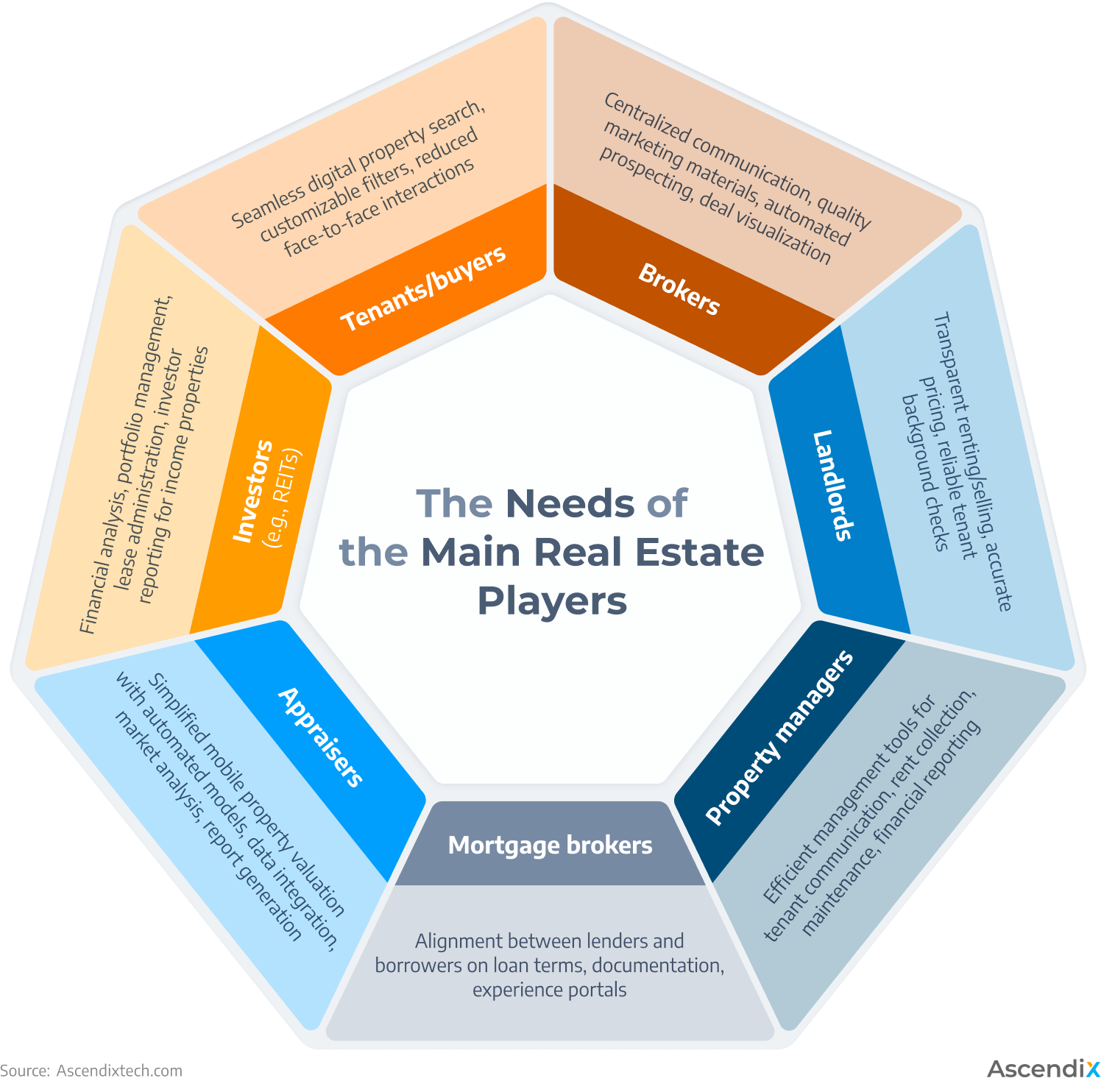
Needs of Real Estate Stakeholders | Proptech Development
By understanding the needs of the stakeholders, proptech companies can develop proptech software that caters to these needs and improves the overall experience for everyone involved in the buying, renting, selling, investing, and lending process.
Key takeaways:
First of all, it must be noted that proptech is still booming and has a lot of income-generating potential to offer to all market incumbents and disruptors in the following decade. To put things in perspective, proptech brought in $30.16 billion in 2022 and is predicted to leap to $133.05 billion by 2032.
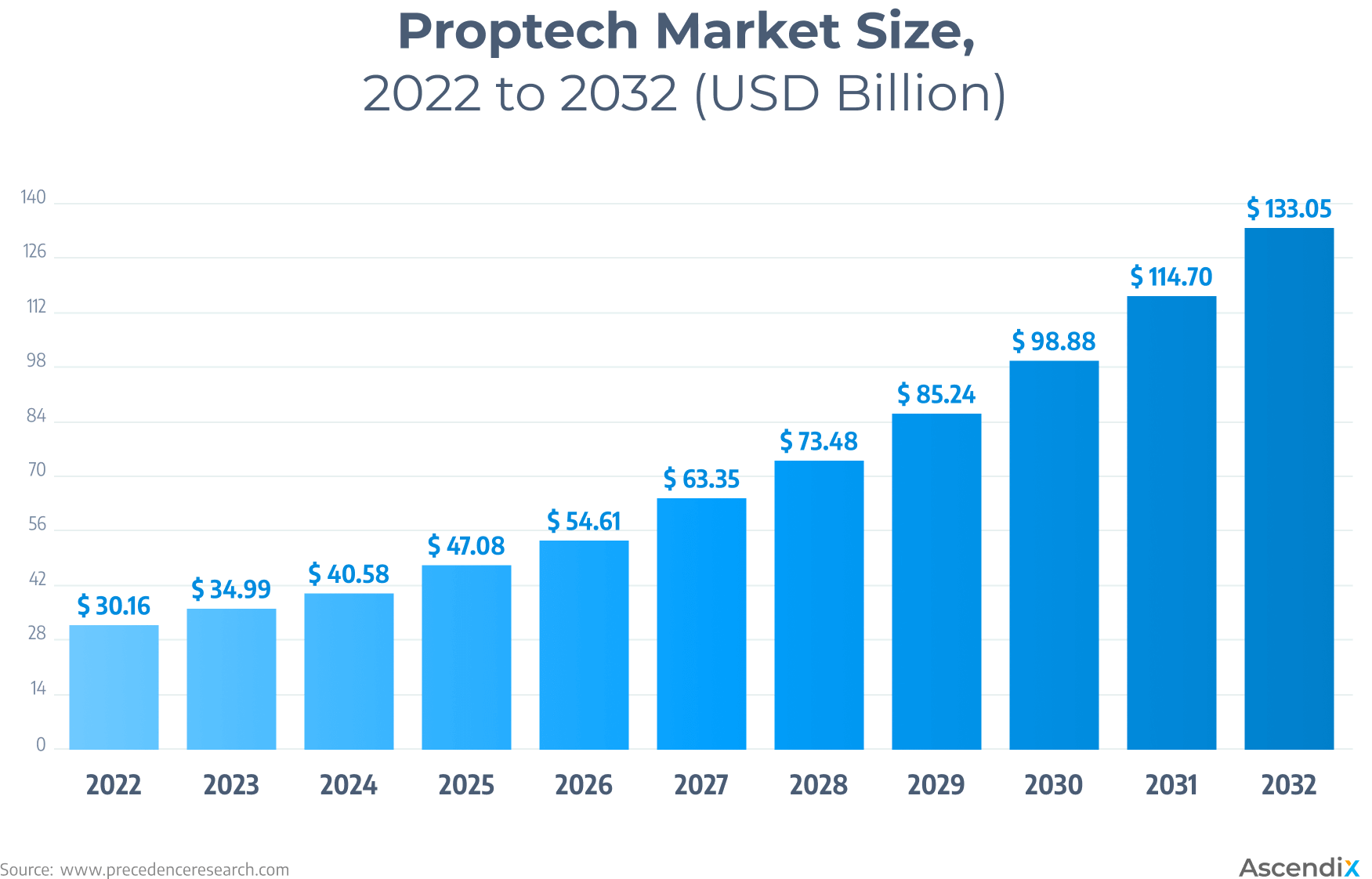
However, depending on where you are located and what market you want your proptech software to target, the market situation may differ. From the illustration below, you can see that the leader in terms of the number of proptech companies founded is North America holding 56% of all proptech initiatives, only to be followed by the UK (805 companies), France (547), and Germany (342).
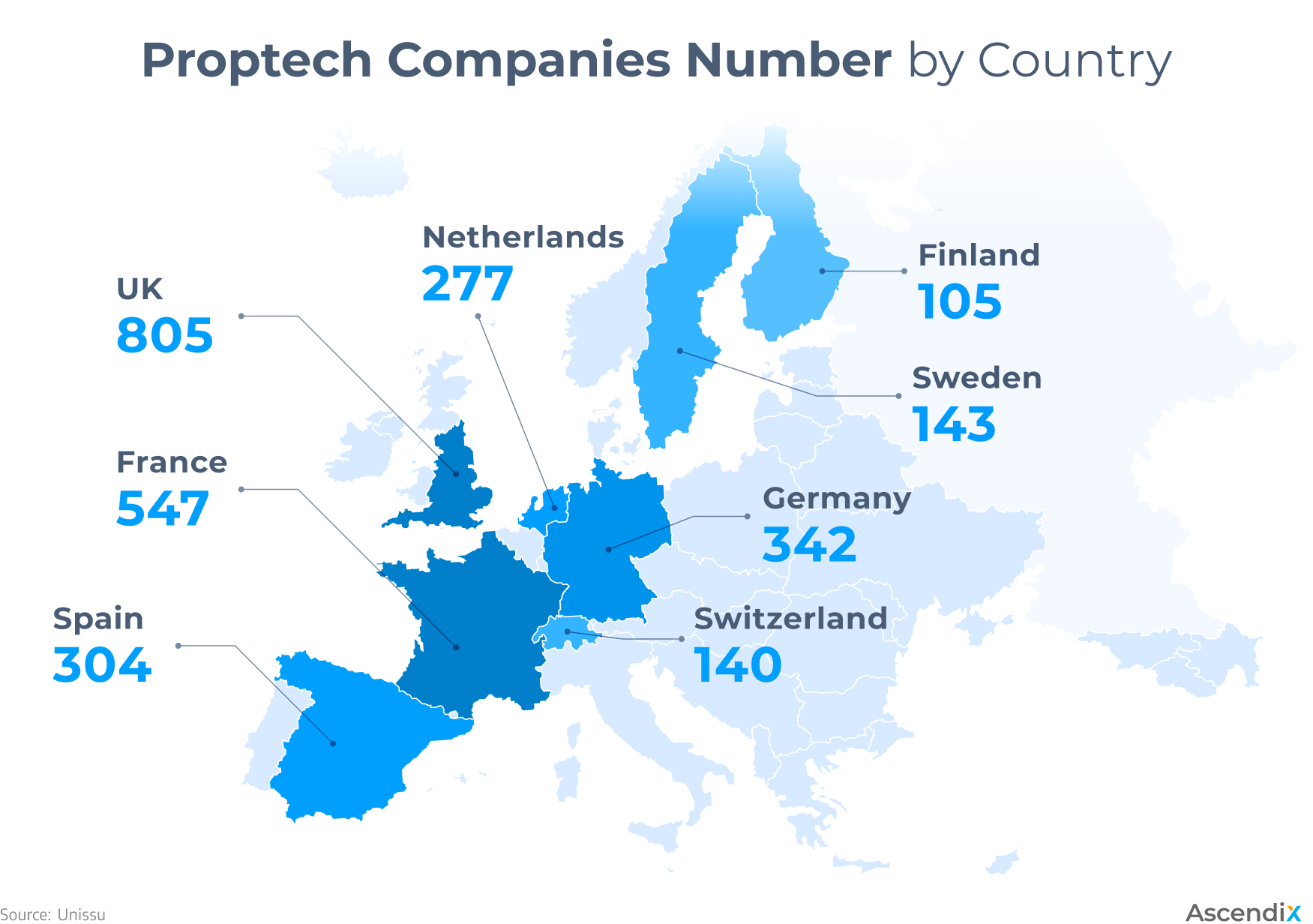
Proptech Software Companies Number by Country
The proptech software market in the USA represents a significant part of the country’s tech sector, thanks to its size, population, and global property powerhouse status. Many proptech innovations come from major tech hubs like New York City and San Francisco, which attract significant domestic and foreign investments.
Approximately 60.04% of proptech software firms in the US operate within the residential sector, 49.84% in the commercial sector, and 11.50% in retail. In terms of customer focus, 69.37% of the proptech companies serve B2B customers, 26.85% cater to B2C, and 3.78% operate in both domains (source).
Notably, most US-based proptech startups, both within the residential and commercial realm, are targeting property management.
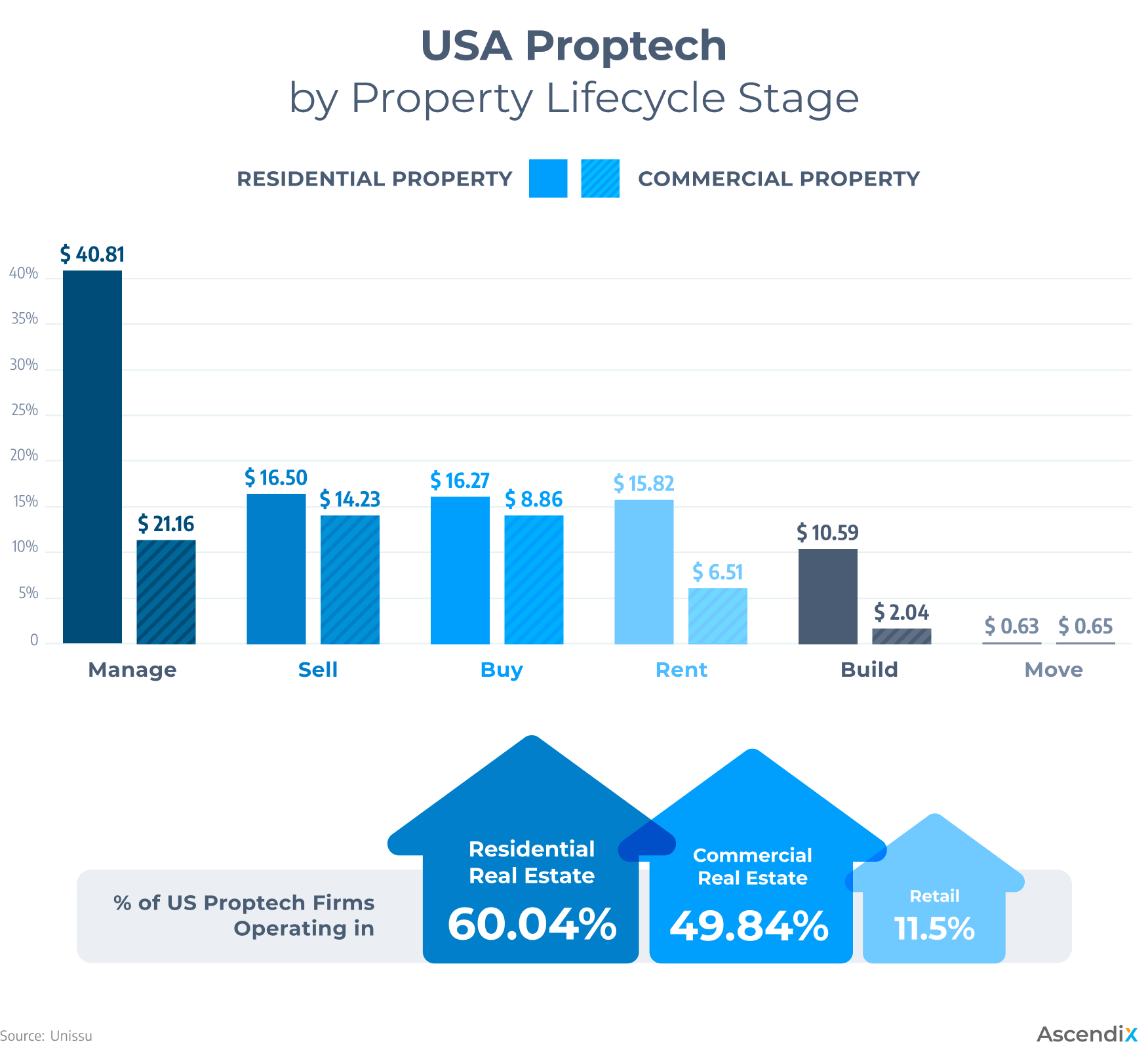
USA Residential Proptech by Property Lifecycle Stage
Some examples of property management proptechs in the US include:
Along with the US, the UK has been at the center of the proptech movement since day one. However, Brexit has cast a long shadow of uncertainty over many industries in the United Kingdom, and PropTech has not been an exception.
The negative effect of Brexit is especially tangible in terms of government Support. Brexit has diverted government attention and resources away from sectors like technology. As a result, government support for technology, including PropTech, has been put on hold to some extent. However, the government-backed geospatial data innovation program, Geovation, continues to support PropTech companies, suggesting that government support is still available but perhaps not as widespread as it could be.
This uncertainty, however, hasn’t stopped London from remaining a significant global hub for proptech software. London is home to more than 500 proptech companies, which is more than Germany has across the whole country, for example.
Similar to the USA, most of these companies, both in the residential nad commercial landscape, are targeting property management.
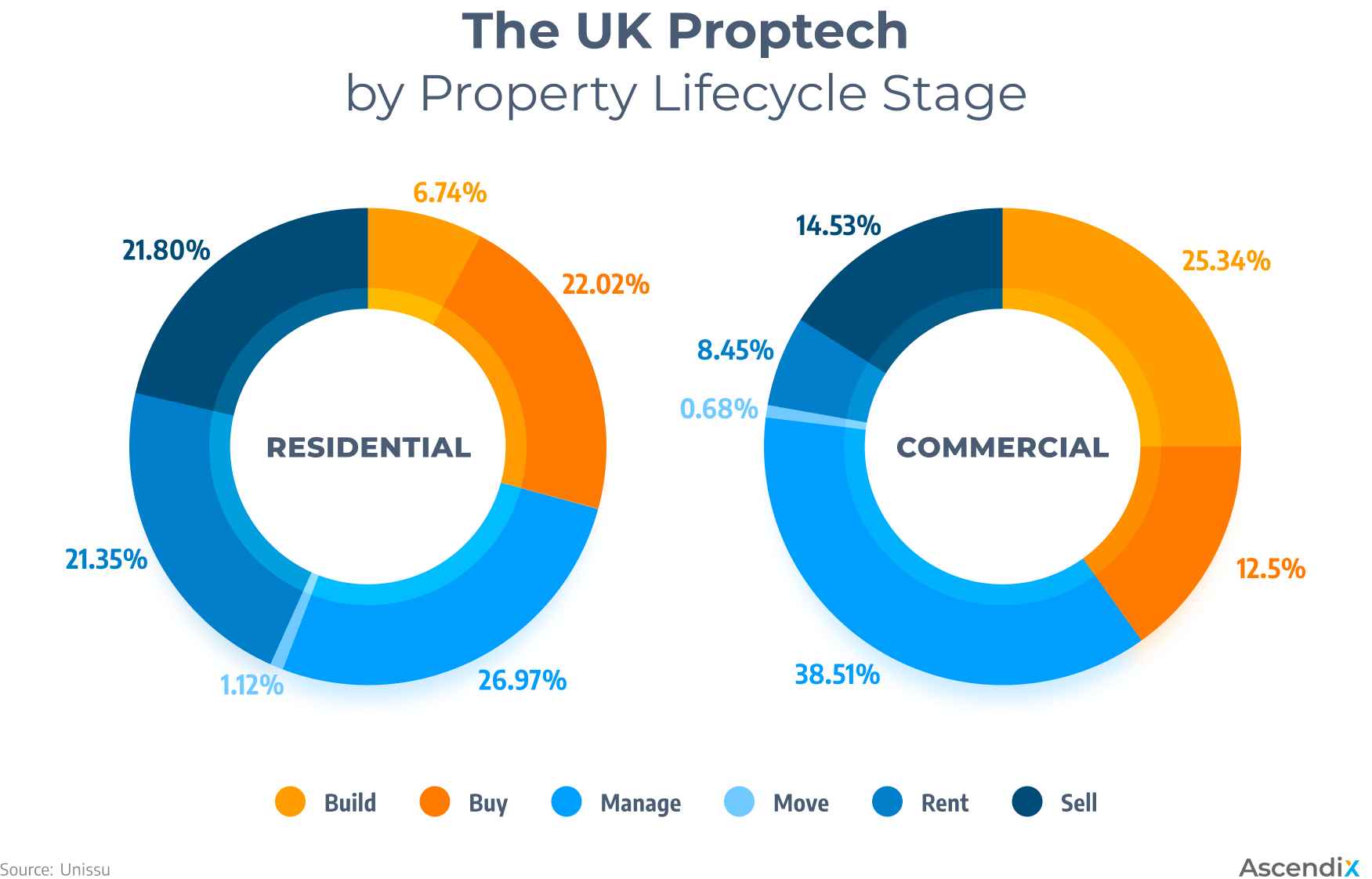
The UK Proptech Software Market by Property Lifecycle Stage
Some notable examples of thriving proptech startups in the UK include:
The French Proptech scene, while relatively new, has been growing strongly and rapidly due to several key factors:
The French proptech software sector is broadly categorized into three areas: residential, commercial, and retail, with residential being the most dominant, covering 71% of the PropTech offerings. The rise of peer-to-peer renting and focus on well-being in neighborhoods demonstrate the innovation within residential proptech.
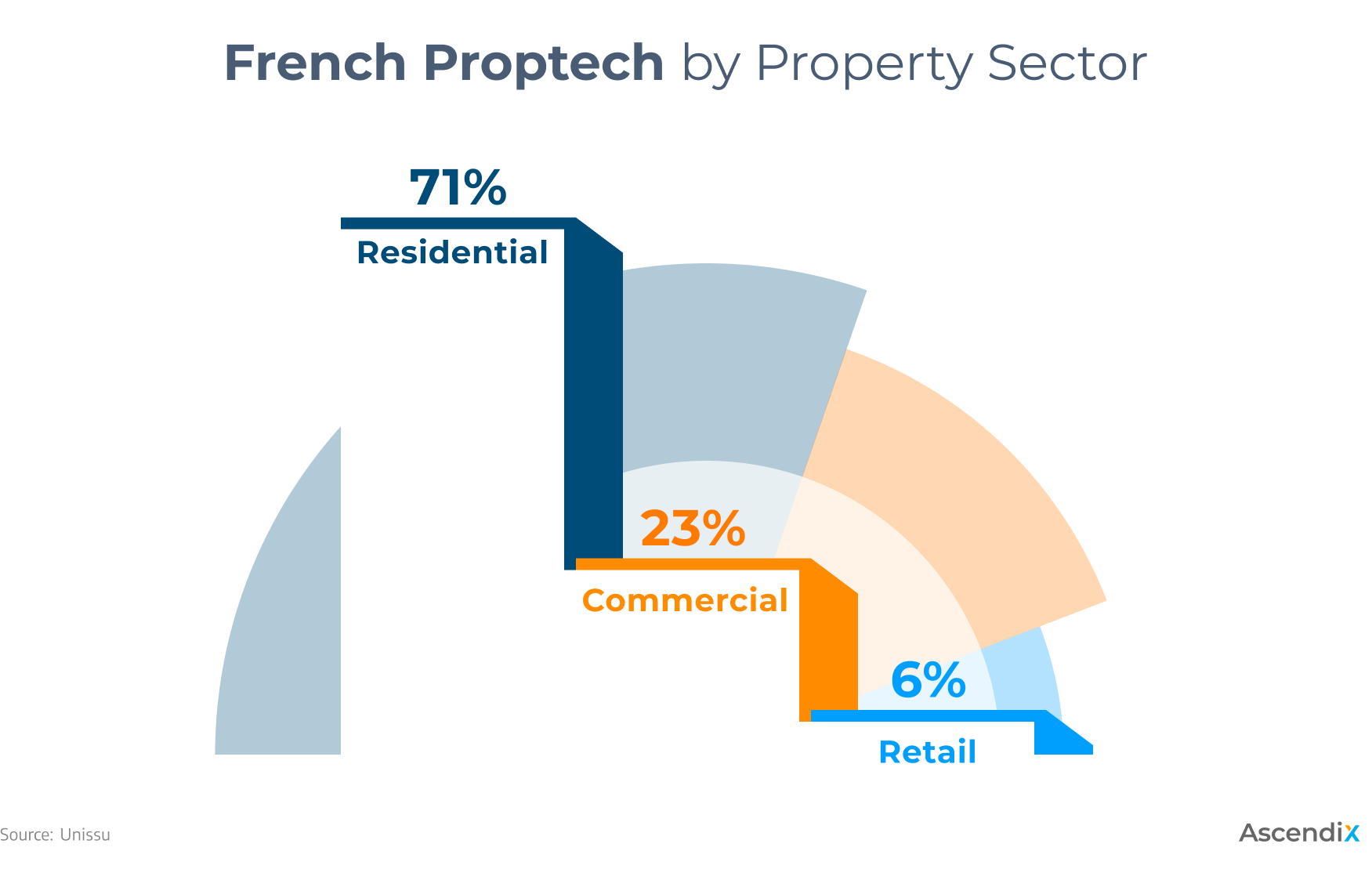
French Proptech Software Market by Property Sector
Some prominent startups focusing on residential real estate include:
The commercial sector comprises 23% of French proptechs, many of which cater to the B2B market. There is an increasing interest in smart buildings and flexible working spaces, with PropTech playing a significant role in this evolution.
Whether you’re looking to streamline property management tasks, enhance building security and energy efficiency, provide virtual property tours, optimize the construction process, analyze real estate investments, or provide data-driven insights into the market, you need to narrow down the type of the proptech software you want to build.
The tools and solutions within the proptech landscape can be broadly divided into various types, including:
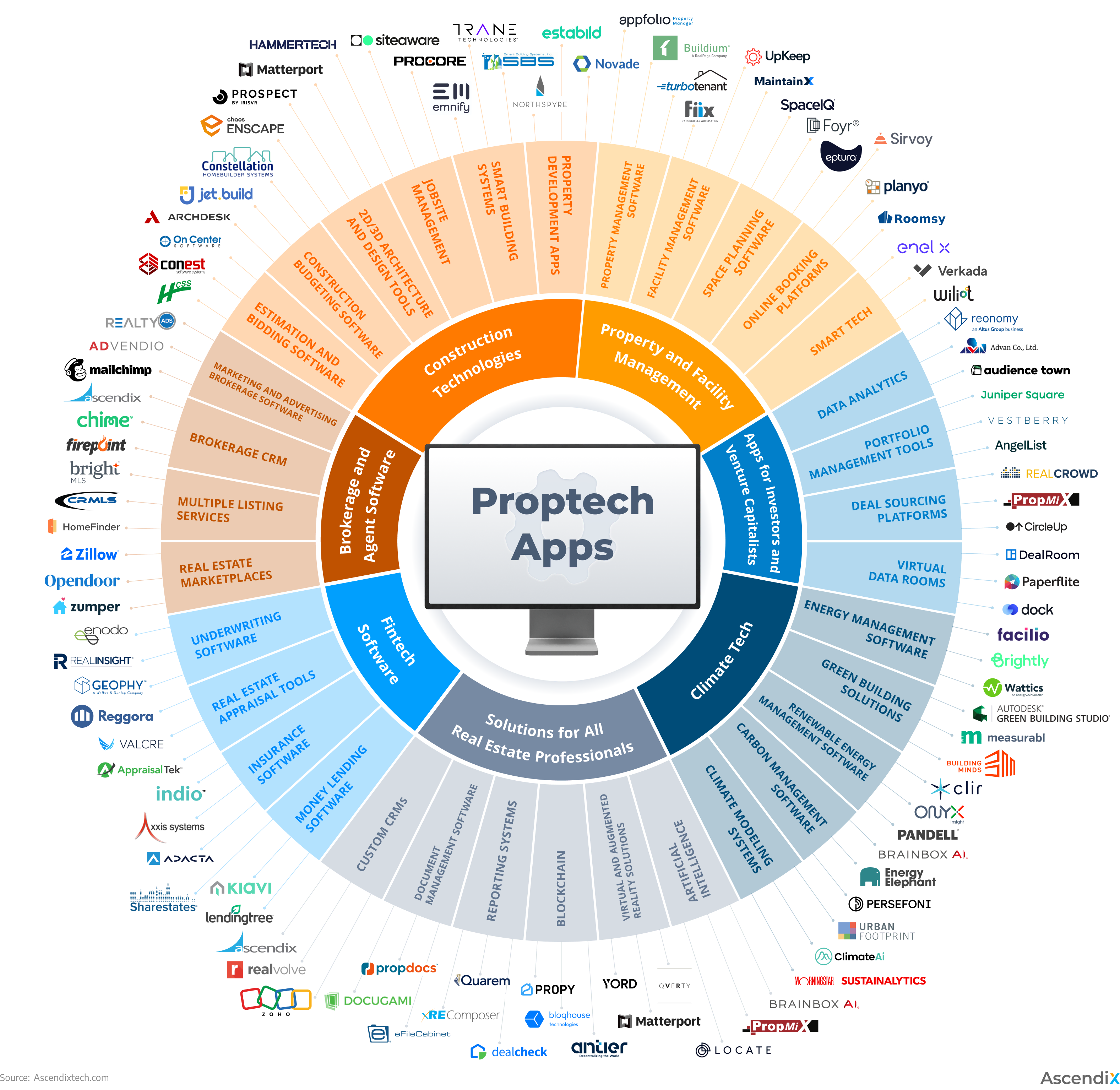
Types of Proptech Apps
Property Management Software (PMS) is a vital Proptech solution that automates and simplifies several critical aspects of property management. Some of the key features of PMS are:
CRM software is a critical tool for businesses of all sizes, enabling them to store, manage, and analyze customer data. To ensure the software meets business needs, it should have several key features.
It is a crucial type of Proptech solution designed to help real estate agents and brokers establish and manage their online presence through:
There is a lot of untapped potential behind document generation software in real estate, as real estate agents and operators need to create property brochures, flyers, and other types of PDFs at all times, which can take quite a bit of your time if you do not have a creative team in place.
Document generation software checks this box. For greater efficiency, we recommend that your document generation software links into your CRM and analytics tools to grab the information for your marketing materials right from your database, saving you time on copy and pasting.
Property Inspection Software is a must-have Proptech solution for property inspectors looking to conduct their inspections more efficiently and accurately.
Real Estate Investment Software is a specialized type of proptech designed to meet the needs of investors in the real estate industry. This software offers a range of features and tools that allow investors to manage and analyze their real estate investment portfolios with ease and efficiency.
The primary features of Real Estate Investment Software are:
Property Valuation Software utilizes advanced algorithms and data analysis techniques to provide accurate valuations of properties quickly and efficiently.
One of the primary benefits of Property Valuation Software is that it offers real estate professionals accurate property valuations based on market trends, property characteristics, and other relevant data. For this, your Property Valuation Software should integrate with MLS and other data sources as well as have real-time data analysis and reporting tools.
This software provides a suite of features that allow real estate agents and brokers to showcase properties online and provide a more engaging experience for potential buyers.
Smart Building Software is a type of PropTech that focuses on improving the operational efficiency and sustainability of buildings. This software provides a suite of tools that allows building owners and managers to manage, monitor, and optimize building systems and operations from a centralized platform.
Smart Building Software offers a range of features, including:
Our team unites true professionals in proptech software engineering who can help you build a bespoke proptech app from scratch.
Artificial Intelligence
AI algorithms revolutionize real estate market development by empowering both landlords and tenants.
Artificial Intelligence allows landowners to use automated smart algorithms that utilize multiple criteria to search for the most relevant renters and accelerate the deal process.
Big Data and Digitization of property data assets
Proptech Big Data solutions provide real estate parties with powerful data-driven insights within all possible aspects, like marketing, sales, investments, and others.
There are several key ways in which the real estate sector is transforming through Big Data solutions and now let’s discuss them.
Building Information Modelling (BIM) technology for housing
BIM helps clients get relevant answers to the following questions:
It becomes possible as answers become automatically generated based on analyzing PropTech big data of similar cases so that it saves much time for property managers and revolutionizes the real estate market.
IoT with drones for 360-view display
Internet of Things has already seized lots of market niches and now it comes to PropTech sector with sufficient benefits.
Simply put, it allows to simplify and automate most building operations in real-time by monitoring and storing important data from sensors, trackers, equipment, weather, and other devices.
What’s more, IoT even enables tenants to get energy savings through the automatic track of historic data collected from installed devices.
In 2021, PropTech startups began massively building advanced 360-view display drones that provide even more customer-oriented data.
This way, Internet of Things is about powerful and automated facility management in the real estate business that wasn’t available before.
Chatbots for customer-focused interaction
Modern PropTech software solutions have integrated chatbots designed specifically to greatly boost customer experience and provide tenants with immediate answers.
Chatbots become a win-win strategy for all parties as landlords can save much time answering basic questions of leads or clients about the building, licenses, etc.
This way, PropTech software with chatbots helps improve communication with clients thus increasing customer loyalty and boosting deal closing ratio.
Contactless Software Entry System
There is no secret that COVID-19 has greatly impacted most aspects of our life and PropTech software market is no exception. The market leaders and companies have sufficiently adapted to current circumstances and began investing time and funds into touchless software entry systems.
This technology provides lots of innovations like contactless check-in software, guest management, smart home systems with automatic and self-managing sensors, etc.
For example, rental platforms like Airbnb and Booking greatly benefit from smart check-in technologies as travelers can now check-in without any contact with landowners.
First, this is super valuable during the COVID-19 pandemic as it reduces potential risks to expand infection volumes.
Second, it saves pretty much time and boosts customer satisfaction while traveling.
Latch is one of the leading proptech startups delivering smart and contactless software entry systems for both commercial real estate market and non-commercial enterprises.
Smart access, guest and delivery management, connectivity technologies, smart home and sensors, and personalization are among its core proptech software offerings.
Before starting the development process, we recommend selecting the most suitable option for your project requirements, timeline, budget expectations, and other criteria.
Let’s discuss the most widespread and effective development approaches out there:
Outsourcing software development of your proptech solution to a technology partner with a solid experience in proptech sector first means that you will mostly get a high-quality final product following the latest standards and trends.
This becomes possible as a software development provider having case studies in developing solutions for the proptech industry perfectly knows what tech stack, features, and scalability are needed.
For example, our Ascendix Tech development teams have helped multiple real estate enterprises like Colliers International, Jones Lang LaSalle (JLL), Cresa, Transwestern, Stiles, and other companies implement customized cutting-edge solutions focused on solving their business needs through proptech software.
Here are the core benefits of hiring a proptech software development company:
This option means you search for a tech-savvy and business-oriented soulmate with solid experience and background in proptech industry. This specialist will fully take care of project technical issues allowing you to focus on strategic tasks like funding, marketing, sales, etc.
The most effective ways to find a CTO are offline conferences/meetups/tech-related events and online platforms like ProductHunt, Reddit, LinkedIn, Founders Network, and so on.
The core benefits of finding a technical partner for your proptech business:
Hiring a freelance team of developers means using online platforms like UpWork, Credo, Fiverr, Outsourcely, Freeeup, and others to find technical specialists that meet your project requirements, preferred development rates, and have reliable experience in building technology solutions for proptech business.
The main advantages of this approach are the reasonable rates, wide talent pool, and faster project delivery. However, you may bump into communication issues, low product quality, project security risks, and failures to meet the set time constraints.
This option supposes you have solid technical skills that allow you to implement at least the skeleton of your proptech software and transform business requirements into useful functionality.
Developing proptech solutions locally may require help from additional specialists like DevOps engineers, QA specialists, and others who will handle important project development activities.
To sum up, this option may become the most cost-efficient, but rather long-running as you should allocate lots of time on proptech software development yourself.
We’re at your service with 16-year expertise in real estate and 26 years in technology services. Learn what proptech solutions we can offer to you.
At Ascendix Tech, we have 25 years of experience in CRM consulting, over 10 years of expertise in delivering technology solutions for real estate companies, and 10 years of custom software development background.
This tried-and-true combination allowed us to build our own proptech software products and help dozens of large market players meet their business goals through high-quality technical implementation and serve thousands of clients around the world.
Now we want to share several proptech software case studies to showcase our technical expertise in delivering cutting-edge solutions for proptech business.
Colliers PropTech Real Estate Lisings Software Development
There is no secret that Colliers International is one of the biggest real estate services companies with over 18,000 employees and $2,8 bln annual revenue as of 2018.
The company contacted and hired Ascendix over 13 years ago to help them implement and customize Dynamics 365 to boost productivity and improve performance of internal teams.
In 2020, Colliers International asked us to build a Property Listings Platform and help their brokers promote availabilities for sale and lease.
Apart from this platform, they also wanted to improve communication and security issues by using robust collaboration and deal rooms and this is how ColliersView appeared thanks to Ascendix Tech’s real estate software development services.
So, here are the key challenged we faced:
Below you can see technology solutions we have delivered:
This way, we have helped Colliers International automate their daily business operations even more and increased real-time data accuracy streamlined the lead-to-deal process, and empowered with advanced promotion opportunities.
Learn what Saimir Qalliu, Managing Director at Colliers International, said about our cooperation:
“ We wanted to make better use of our data and present it in a format that our professionals and clients would find attractive and easy to access. This required a new digital solution, hence the engagement with Ascendix on this latest project.
The idea of presenting data in an easily accessible and pleasing way to the consumer was not new. We just wanted to have our ability to execute it within our space, with our own data, for our professionals and clients. ”
Proptech software development is a relatively new, but extremely promising direction for real estate businesses and clients helping both parties revolutionize their interaction and take the real estate services market to a new level.
The process of building proptech software is a complex of skillsets and latest trends combined to solve real problems of all parties. At Ascendix Tech, we have solid experience in proptech software development and would be glad to help turn the challenges of your company into tailor-made technology opportunities that will help you grow and scale.
If you want to discuss your project idea, feel free to check our case studies and contact us. We will be glad to engage in a discussion to better understand your goals and objectives and if appropriate, provide you with a free estimate of your proptech software development requirements.
Alina is a proptech technology expert and a storyteller at Ascendix, investigating the real estate market and sharing her insights and tips with up-and-coming proptech startups, established real estate agencies, and industry stakeholders. She talks about real estate technology, business automation, and industry news.
Get our fresh posts and news about Ascendix Tech right to your inbox.